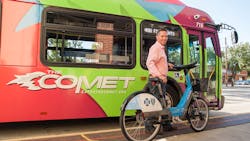When John Andoh* was hired as CEO and executive director of the Central Midlands Regional Transit Authority (The COMET) in 2018, the board said the system had become stagnant; ridership had started to plateau and there were several unmet needs regarding service offerings. So, Andoh set out to find innovative ways to integrate different mobility options to address food deserts, expand nighttime transit hours, connect people to employment centers, provide first-and-last-mile connections and expand service options for seniors and people with disabilities.
“That was the catalyst of what got us to start looking at how we could be more of a mobility manager,” said Andoh.
In about three years, The COMET has addressed all these unmet needs by introducing new mobility options, implementing technology upgrades, pursuing discretionary funding and leveraging partnerships. The COMET can now seamlessly provide specialized trips for niche groups previously underserved by the traditional fixed route and paratransit system by integrating these various mobility services.
COMET on the GO with TNC Partnerships
Andoh explains the frequency and layout of The COMET’s system created gaps in nighttime service and was “just not connecting people effectively to grocery stores.”
Instead of accepting the status quo, Andoh began brainstorming of something that would be a low-cost solution and easy to get off the ground quickly. The answer? Establishing a partnership with Transportation Network Companies (TNCs) Uber and Lyft to offer a new mobility service, COMET on the Go!
“We went one step further and came up with a creative idea that nobody [was] really thinking about before,” Andoh said.
While TNC partnerships primarily focus on first-and-last-mile connections, this program is unique in that it addresses nighttime service gaps with COMET @ Night and food equity with COMET to the Market. To do this, the agency partnered with Uber and Lyft in January 2019 to subsidize rideshare trips that started by providing promotional codes for $5.00 discounts that increased to $8.00 in January 2021. Both services run seven days a week, with the nighttime service operating from 9:00 p.m. to 3:00 a.m. and the grocery service operating from 6:00 a.m. to 8:00 p.m. The services integrate with Catch The COMET and Transit mobile apps.
To better address food equity, COMET to the Market solely provides rideshare trips to grocery stores for people who live in food deserts as designated by the South Carolina Department of Health and Environmental Control, improving food equity by removing barriers to people getting to grocery stores on a regular basis. The agency identified every grocery store with meat and produce in the area, so people can choose where they shop instead of limiting them to their neighborhood store.
Pre-pandemic, ridership was growing, “and that was our mechanism of success—that we are truly helping connect people to grocery stores,” Andoh said.
Another success to come from these TNC partnerships, specifically with the night program, is the cost savings. Instead of seeing TNCs as competitors, Andoh explains The COMET views TNCs as complementary to transit since it is more cost-effective for them to use cars for door-to-door trips versus running a network of buses carrying less than 1.5 passengers per hour.
“Launching these programs allowed us to demonstrate that we are returning value to the penny sales tax [which was approved by voters in 2012],” Andoh said.
Blue Bike Comes to Downtown
Since The COMET’s TNC partnerships focus on other types of trips, the agency has leveraged bikeshare to bridge first-and-last-mile connections in the downtown area. Blue Bike, launched in October 2018, is owned by the city of Columbia, S.C., contracted to Bewegen and operated and maintained by the agency. The vision for the service was to be “truly integrated” into the rest of the system and not just a “standalone service,” explains Andoh.
Riders have access to 18 stations throughout downtown Columbia and can purchase passes via the six kiosks throughout the bikeshare system using credit, debit and Visa or MasterCard gift cards or riders can also use their COMET Card or the Blue Bike mobile app. These options ensure accessibility for all by catering to people who don’t have a debit or credit card, or access to a smartphone. As a bonus, COMET users can get free, unlimited 45-minute rides.
"We treat Blue Bike almost like a bus route because you can just tap your COMET Card on the kiosk and get that free bike,” Andoh said.
Blue Bike is also integrated into all the platforms customers use to plan and pay for their trip, such as Catch The COMET App (Passport) that not only allows users to purchase bus fares, passes for paratransit, trip plan with real-time arrival information but also link to social media, Blue Bikes and the city. The COMET has also partnered with moovit and Transit to offer a Mobility-as-a-Service app, where passengers can check the status of Blue Bike stations, access real-time arrival information and purchase fares and passes. Real-time arrival information is provided via TransLoc.
Vanpool Brings Transit to Employers
The COMET’s Vanpool Program, operated by Enterprise, provides access to employment sites that are beyond the fixed-route transit system and allow commuters to set their desired commute, explains Andoh. However, the agency approached this service a bit differently than other vanpool programs.
“We wanted Enterprise to go to employment sites that were not in the common fixed-route service area and sell the concept of transit to them, [saying] we’ll promote this van to your employees [and] we’ll pay that $500 towards the van. You help us in getting people to use the service,” Andoh said.
This approach allows them to test the concept of transit and can be a potential catalyst to creating an express bus route if The COMET sees a large group of people regularly going to one employment site. Several employers have jumped at the opportunity of implementing a fixed bus route, such as Fort Jackson, McEntire Produce and Michelin.
“Before, they had nothing,” Andoh said. “They didn’t know how to reach out to us on how to get something when the question was asked. And it also allowed them to reach out to people for job recruitment from areas where they couldn’t [before] because they [had] a lack of transportation.”
Increased Access for Seniors and People with Disabilities
Just as new services and technology is important, so is leveraging partnerships and grant funding explains Andoh, who tasked the agency’s grants and regional coordination manager to slow down their penny spending and explore other discretionary funds. Andoh adds the manager has been pretty successful in getting grant funding. One example is the Federal Transit Administration grant that was awarded for The COMET’s volunteer mileage reimbursement program and a subsidized transportation program.
The agency partnered with Able South Carolina to launch the Volunteer Transportation Program (V-Trip) and the Taxi Voucher Pick Up Program (PUP) in January 2021 to provide better access to transportation for seniors and persons with disabilities underserved by the present transit system. V-Trip reimburses 57.5 cents per mile, up to 100 miles each month. PUP gives a $50 subsidy on taxi or ridershare (Uber and Lyft) trips each month. The services are operated 24 hours a day and are offered to people who live outside the agency’s service area, live in Richland or Lexington Counties and live inside the Columbia urbanized area.
Another discretionary grant awarded to The COMET in partnership with Foenix Mobility is the Innovative Coordinated Access and Mobility (ICAM) Grant, which will increase access to healthcare services for residents.
“We’re going to be utilizing their technology to connect seniors, persons with disabilities and low-income folks to healthcare in a more seamless manner,” Andoh said. “Foenix Mobility is also putting together an app to help people who need access to the pharmacy or medical or dental appointment [to] match them to whatever available transportation option is available to them.”
In addition to more specialized services and mobile app, The COMET is also updating its technology offerings for its paratransit service. The agency has been working with TripSpark to migrate to its Passenger Portal that integrates with Trapeze PASS to provide notifications and allow customers to reserve and cancel their paratransit trips.
Niche Services Boost Public’s Perception of Transit
By tailoring services to niche demographics and providing user-friendly technology to access them, the agency is able to not only provide a more efficient, individualized service but also attract riders who may not ride a fixed busroute, but would use Comet @ Night to get home after dinner. And this has helped the public change its perception of what public transit can do. By being active in the community, Andoh describes how people are seeing the agency in a new light and as a way to enrich lives of residents.
“People are starting to see The COMET as progressive and see it as valuable in offering mobility options in moving people from A to B versus this public service tax subsidy that's not providing any value,” Andoh said. “People are seeing The COMET is truly a good community partner. If there’s an idea [that’s] pitched to me, we will try to find a way to make a transit component to it so that we can be a part of it.”
-----
*Editor’s note: John Andoh was interviewed prior to submitting his resignation from his position as executive director of The COMET on April 5.
About the Author
Megan Perrero
Editor in Chief
Megan Perrero is a national award-winning B2B journalist and lover of all things transit. Currently, she is the Editor in Chief of Mass Transit magazine, where she develops and leads a multi-channel editorial strategy while reporting on the North American public transit industry.
Prior to her position with Mass Transit, Perrero was the senior communications and external relations specialist for the Shared-Use Mobility Center, where she was responsible for helping develop internal/external communications, plan the National Shared Mobility Summit and manage brand strategy and marketing campaigns.
Perrero serves as the board vice president for LIT and is a member of the American Public Transportation Association Marketing and Communications Committee. She holds a bachelor’s degree in multimedia journalism with a concentration in magazine writing and a minor in public relations from Columbia College Chicago.

